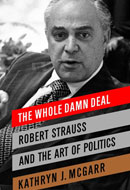The Whole Damn Deal

On April 2, 1979, President Jimmy Carter recorded in his diary that he had asked Robert S. Strauss to be his Mideast peace negotiator. Strauss answered, "I've never even read the Bible. And I'm a Jew." Observance-wise, Bob Strauss, who spent 50 years as a consummate practitioner of American politics, wasn't much of a Jew. Yet his outsized career paints a surprisingly familiar portrait of Jews in post-World War II America.
There is an excellent recent biography of Strauss titled The Whole Damn Deal—which is what Strauss always said when he was asked what he liked best about his career. Strauss was inclined to like things. His father Karl—Charlie, after he immigrated from Germany in 1906—was a traveling salesman who reached West Texas, married, and went to work in his father-in-law's dry goods store. Young Strauss was raised in a town with two Jewish families. He experienced his only moment of religious exclusion when the local minister told him why he couldn't be president of the Baptist Young People's Union.
The Strausses observed the High Holy Days, but that was about it. Un-Jewishly, they celebrated Christmas. More un-Jewishly, Bob's mother told him "not to study too hard" or he'd "get an ulcer." (Strauss later established a scholarship for a promising high school student of "mediocre academic standing.")
At the University of Texas Strauss learned that only Jewish fraternities were open to him. So he pledged Sigma Alpha Mu, began dating his future wife—Helen Jacobs, daughter of a Dallas businessman—and, with his prodigious fundraising talents, became "the most popular Jewish boy on campus." After spending World War II as an FBI agent, he started his own Dallas law firm. He was excluded from the WASP golf clubs but joined the Jewish country club and began fundraising for Jewish charities. He became president of Temple Emanu-El—though, unlike other presidents, he never sat on the bimah with the rabbi at Friday night services.
Indeed, Strauss joined everything he could—Citizens Council, Goodwill Industries, Community Chest. After he handled the finances for his classmate John Connally's successful Texas gubernatorial campaign in 1962, Connally put him on the State Banking Board. Strauss handed out bank charters. When accused of favoritism, he disarmed critics with what would become his trademark method: frank admission. "If you ask me am I guilty," he said, "the answer is 'yes.' I did my damnedest to get any friend of mine a charter. Didn't have any problem doing that."
Strauss was close to President Lyndon Johnson—and every president thereafter for 30 years. After the Democrats' fratricidal conventions of 1968 and 1972, he became party chairman. He served successfully as Carter's Special Trade Representative, less successfully as Mideast envoy (he was eaten alive by the State Department and National Security Council, the only political players he couldn't charm). After heading Carter's failed 1980 re-election campaign, Strauss befriended his last two—Republican—presidents and made his Washington law firm rich. He had done the same for himself years before. In 1991 he was named ambassador to Moscow, his last major post.
All this chronology raises the real question: What was it about Strauss? What made him a friend of whoever occupied the White House?
First, he was loyal. When he entered politics, large decisions were made by small groups of men for whom the premier virtue was loyalty. Strauss behaved accordingly. But loyalty came naturally to him: For decades he had the same wife, the same law firm, the same vacation home, the same poker game, the same racetrack.
Next, he never got too sophisticated to like the ordinary trappings of wealth and influence. He once advised another lawyer to build himself a swimming pool: "Helen and I built a pool. Every night I come home from work and look out at that swimming pool, which I've never been in, and I say, 'Strauss, you are one rich sumbitch.'" At the 1976 convention, his New York headquarters was the restaurant "21."
Also, Strauss was a negotiator who rarely let his personal views get in the way of an agreement. He sometimes told less than the truth, but by all accounts he was a consummately honest broker. When the Japanese firm Matsushita bought Lew Wasserman's MCA agency, both companies hired Strauss. People asked him which party he represented, and he'd say, "I represent the deal."
Here, too, he was a natural, loving the process of compromise. He was immensely proud of "my convention" of 1976, which gathered in Coretta King, George Wallace, Arthur Krim, and Strauss's rabbi from Temple Emanu-El.
Finally, Strauss was careful. He handled pre-Watergate funds in pre-Watergate ways—but never strayed too far from prevailing standards. Federal officials investigated him in the matter of a certain suitcase full of corporate cash; but they declined to prosecute after Strauss's lawyer pointed out to them, "If Strauss, then everyone." Strauss did not end up like that other Washington super-lawyer, Clark Clifford, who died having been indicted for his role in a banking scandal.
Well, not quite finally—because all of Strauss's prudence was wrapped in a layer of cheerful bluster. He was the funniest man in Washington, and he knew it. He loved the press, which loved him back. He seemed unable to speak a sentence without "goddamn," "son-of-a-bitch," or "whore." When he took over the Democratic Party, he said his first instruction to the staff was to "stop screwing in the elevators." He sounded like a loud-mouthed pol. Underneath, there was a pretty careful nice Jewish boy.
Strauss practiced at a time when politics and business were growing more entwined and both were becoming more inclusive. Sitting at a Xerox board meeting with fellow director Vernon Jordan, he said, "You know, Vernon, it's too bad our grandparents didn't live to see this. It was not intended that you and I would be sitting in this board room together." The landscape was changing. Strauss, like many American Jews, had the qualities that enabled him to navigate it.
Comments are closed for this article.




